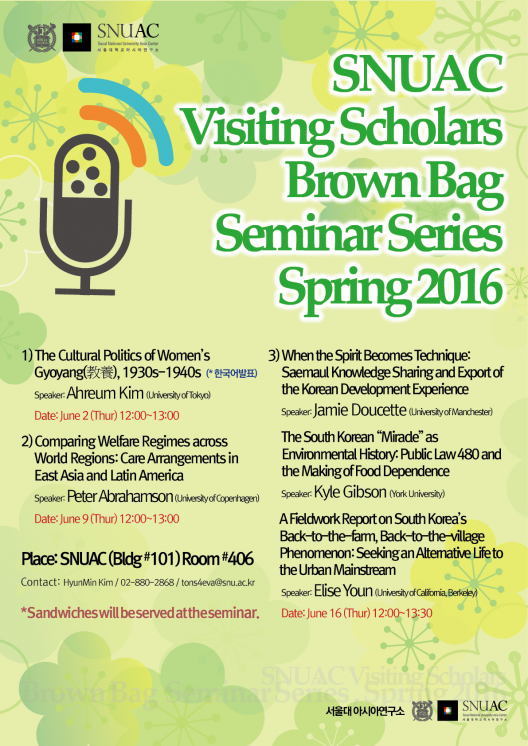| |
 | |
When the Spirit Becomes Technique: Saemaul Knowledge Sharing and Export of the Korean Development Experience
Jamie Doucette
This talk examines South Korea’s recent effort to promote its 1970s authoritarian-era rural modernization program, Saemaul Undong (New Village Movement), as the‘iconic’ model of its international development cooperation assistance. To better understand how this movement has been represented, this article examines the policy narratives that have been produced by the Korean government’s Knowledge Sharing Program (KSP) and circulated through multiple development cooperation initiatives. These narratives portray Saemaul as the key to Korea’s developmental success: a mental revolution in values that inculcated the‘can-do’ spirit in poor rural villages and allowed them to escape poverty and stagnation. However, the emphasis of this narrative on the spiritual, voluntary, and value-oriented nature of the movement has been used to ‘render technical’ Korea’s development experience: i.e. to reduce it to a question of how development experts successfully cultivated the spirit of development in the Korean people and, by extension, how developing countries might do the same. This talk argues that this narrative neglects the contested history and Cold War context of Saemaul, and raises questions about the ‘brand’ of development assistance that has been built upon it.
Jamie Doucette is Lecturer in Human Geography in the School of Environment, Education and Development at the University of Manchester and is currently a Visiting Scholar at Seoul National University Asia Center on a Korea Foundation Fellowship for Field Research. His research interests include the political economy of Korean democratization and development, the transformation of Korean labour relations, and the nexus between sovereignty, territory and economy in East Asia. His articles have appeared in such publications as Transactions of the Institute of British Geographers, Political Geography, Critical Asian Studies and the Journal of Contemporary Asia, among others.
The South Korean “Miracle” as Environmental History: Public Law 480 and the Making of Food Dependence
Kyle Gibson
Judged by the central measure of postwar “development” i.e. GDP the South Korean industrialization process under President Park Chung Hee was nothing short of remarkable. Achieving near double digit growth rates for three decades (c.19601990),
South Korea has been both the envy of developing nations in the Global South and the object of intense debate in academic and policy circles. In attempting to explain South Korea’s rapid growth, the debate has been dominated by neoliberal versus Keynesian statist frameworks. Almost completely absent from the discussion, however, is an examination of the socioecological foundations underpinning South Korea’s economic ascent. This talk will address this issue through a look at the role of US food aid (PL 480) in Park’s exportled industrial drive and the escalating food dependence it eventually brought about in South Korea.
Kyle Gibson is a PhD candidate in the Faculty of Environmental Studies at York University in Toronto, Canada. His main research interests include environmental political economy, world history, and critical development studies. He can be contacted at kylegibson@hotmail.ca .
A Fieldwork Report on South Korea’s Back-to-the-farm, Back-to-the-village Phenomenon: Seeking an Alternative Life to the Urban Mainstream
Elise Youn
This talk will be a report based on ongoing fieldwork of South Korea’s contemporary kwinong, “back-to-the-farm” (귀농), kwich’on, “back-to-the-village” (귀촌) phenomenon. In what ways is the kwinong/kwich’on phenomenon a reaction to a crisis of South Korea’s ongoing developmentalism? How does studying the process by which kwinong and kwich’on hopefuls attempt to exit South Korea’s urban, industrialized, capitalist “mainstream” by going back to small-scale farming, help us understand contemporary South Korean developmental subjectivity? The fieldwork is based on interviews and ethnography with kwinong/kwich’on hopefuls attending kwinong/kwich’on camps and schools, as well as recent kwinong/kwich’on participants. It attempts to shed light on the reasons why they seek to drop out of South Korea’s “mainstream,” and the specific ways they try to remake their lives differently through “returning” to farming and village life.
Elise Youn is a Ph.D. Candidate in Geography at the University of California, Berkeley conducting dissertation fieldwork on Korea’s “back-to-the-farm” (귀농), “back-to-the-village” (귀촌) movement and phenomenon.
Date & Time: June 16 (Thur) 2016, 12:00-13:30
Location: SNUAC #406
*This will be a group presentation by 3 visiting scholars
(Jamie Doucette, Kyle Gibson, and Elise Youn)
|
|